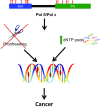Pools and Pols: Mechanism of a mutator phenotype
- PMID: 25931524
- PMCID: PMC4434749
- DOI: 10.1073/pnas.1505169112
Pools and Pols: Mechanism of a mutator phenotype
Conflict of interest statement
The authors declare no conflict of interest.
Figures

Comment on
-
dNTP pool levels modulate mutator phenotypes of error-prone DNA polymerase ε variants.Proc Natl Acad Sci U S A. 2015 May 12;112(19):E2457-66. doi: 10.1073/pnas.1422948112. Epub 2015 Mar 31. Proc Natl Acad Sci U S A. 2015. PMID: 25827226 Free PMC article.
-
Colon cancer-associated mutator DNA polymerase δ variant causes expansion of dNTP pools increasing its own infidelity.Proc Natl Acad Sci U S A. 2015 May 12;112(19):E2467-76. doi: 10.1073/pnas.1422934112. Epub 2015 Mar 31. Proc Natl Acad Sci U S A. 2015. PMID: 25827231 Free PMC article.
References
Publication types
MeSH terms
Substances
Grants and funding
LinkOut - more resources
Full Text Sources
Other Literature Sources
Molecular Biology Databases

